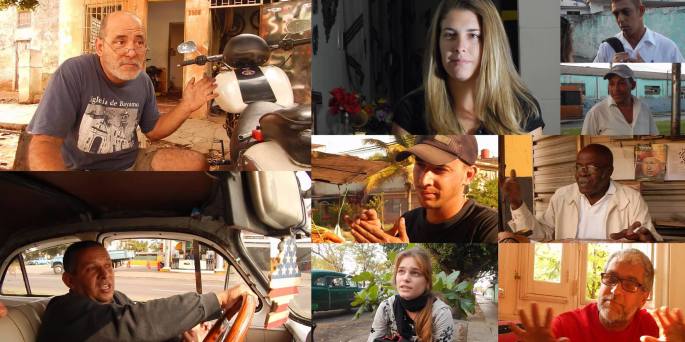
Cuba-U.S. dialogue: ‘They’re talking about us’
HAVANA — The young programmer, with scant access to the Internet and numerous online services blocked (because she’s Cuban), has seen her father five or six times in 11 years. Cuba is a country rent by emigration from one end to the other, no question about it.
A U.S. academician says that, although she’d like to be optimistic, she knows her native country well and fears that, though the methods may change, the objective remains the same. “There’s always a back-story when it comes to a Cuban in a U.S. university,” she says.
The only sure thing now is that, while the young programmer and the academician ponder their situation, the governments of Cuba and the United States are sitting down at a table for the first time in half a century to negotiate, for a start, the accords that would improve the migratory relationship and the materialization of renewed diplomatic relations.
The talks began today, led on the Cuban side by the director general of U.S. affairs at the Foreign Ministry, Josefina Vidal Ferreiro, and, on the U.S. side, by the deputy Assistant Secretary of State for Western Hemisphere Affairs, Edward Alex Lee, and the Assistant Secretary of State for Western Hemisphere Affairs, Roberta S. Jacobson.
“Now is when the ideological battle really begins, when the other party sits down at the table,” says Juan Pin Vilar, a television director. Vilar, who produced the Pancho Céspedes concert at the Karl Marx Theater last September, is also pleased because presidents Raúl Castro and Barack Obama fooled hundreds of functionaries who now have to readjust to a new policy.
“Bureaucracy is not just paperwork but also a state of mind,” he says, “and that’s going to be harder to change.”
Although expressing satisfaction with the new scenario, many Cubans prefer to save the outbursts of joy until the measures are put into practice. “I’ll believe it when I see it,” says an audio technician who went into private business some years ago.
“What we can expect from the Americans is a box of surprises,” says Félix Izquierdo, an old newspaper vendor. “They don’t give anything away without expecting something in return, that’s for sure. Now, they’re figuring out how much money they can make in this deal. That’s the way it has been all along. We’ll have to wait to see what advantage we can gain, because they’re going to try to impose their policies, which are based on the economy of millionaires.”
Representatives of U.S. political and economic powers have shown themselves in favor, in an open letter to President Obama. In it, 77 signatories express their hope that “future efforts by the Administration will be matched by quick adoption of streamlined regulations that fulfill your intent and we will continue to monitor those developments.”
The U.S. Government on Jan. 16 activated a package of Amendments to the Sanctions against Cuba. Among the novel changes are the authorization of travel to Cuba, the elimination of categories and permits heretofore obligatory for travel, and an authorization for the sale of devices, software, applications and services for the improvement of telecommunications. That’s a first step that requires a response from this side of the Straits.
At a bus stop in Playa, I ask a street vendor whose lives could be improved by the reestablishment of relations. “Everyone’s,” he answers without hesitation. Hope springs eternal.
“That’s true,” says Félix Ariel, a produce vendor. “We can benefit a lot, but that remains to be seen. The blockade is absurd, obsolete, and things would improve a lot in every sense, but now everything depends on what happens at those talks and how far they want to go.” There is no outpouring of emotion.
“That’s what everybody hopes; for everything to improve,” says Raúl García, a taxi driver. “Let’s hope so. We need car parts, tires, etc. Ever since the self-employment revolution began, there’s been talk of a supplies warehouse, but that doesn’t exist. If this is the way to get repair parts, God bless it.”
In the new context, we see more high-ranking U.S. officials arriving on the island. The latest news was the arrival last week of Democratic senator Patrick Leahy at the head of a group of legislators.
Leahy, who came to Cuba in February 2013 and was received by President Raúl Castro, said that this time he would have an opportunity to speak with many people and that he would later convey his impressions to President Barack Obama.
During that visit, it was announced that New York governor Andrew Cuomo is planning a trip to Havana. He will head what may be the first commercial mission of the “Global NY” strategy and perhaps the first visit with purely economic purposes after Dec. 17.
On Jan. 20, during his State of the Union address, Obama told the GOP-led Congress that he would proceed with his Cuba policy. “In Cuba, we are ending a policy that was long past its expiration date,” he said. “When what you’re doing doesn’t work for fifty years, it’s time to try something new.”
About the recent rapprochement, some in Cuba opine that the stark news treatment that has predominated in the national media, to which most Cubans have access, no longer makes sense.
“Raúl and Obama spoke to the world at the same time. Then, and for a week thereafter, the world media discussed the subject and gave their opinions and views,” said Vilar, suggesting that the national press should have done the same.
“After so many years of discrepancy between the two nations, it’s time for a friendly link,” says a medical student.
Apparently, U.S. society agrees. According to a Pew Research survey published Jan. 17, 63 percent of U.S. citizens support their president’s decision, after half a century of political confrontation with their neighbors. Nevertheless, although the positive signals are numerous, many are still keeping their fingers crossed.
Photo and video: Carlos Ernesto Escalona Martí (Kako)


